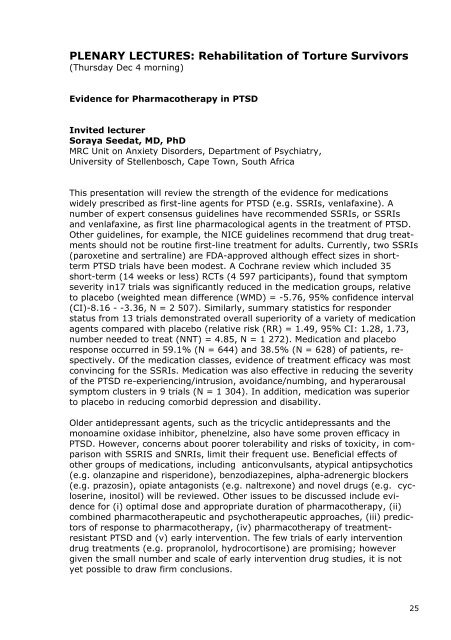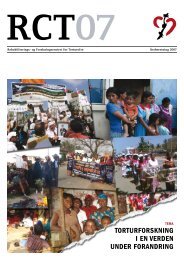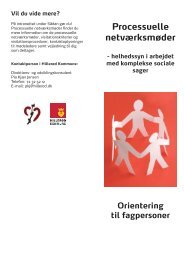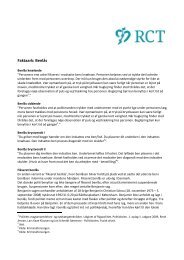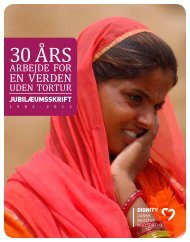Rehabilitating Torture Survivors - Dignity - Danish Institute Against ...
Rehabilitating Torture Survivors - Dignity - Danish Institute Against ...
Rehabilitating Torture Survivors - Dignity - Danish Institute Against ...
You also want an ePaper? Increase the reach of your titles
YUMPU automatically turns print PDFs into web optimized ePapers that Google loves.
PLENARY LECTURES: Rehabilitation of <strong>Torture</strong> <strong>Survivors</strong>(Thursday Dec 4 morning)Evidence for Pharmacotherapy in PTSDInvited lecturerSoraya Seedat, MD, PhDMRC Unit on Anxiety Disorders, Department of Psychiatry,University of Stellenbosch, Cape Town, South AfricaThis presentation will review the strength of the evidence for medicationswidely prescribed as first-line agents for PTSD (e.g. SSRIs, venlafaxine). Anumber of expert consensus guidelines have recommended SSRIs, or SSRIsand venlafaxine, as first line pharmacological agents in the treatment of PTSD.Other guidelines, for example, the NICE guidelines recommend that drug treatmentsshould not be routine first-line treatment for adults. Currently, two SSRIs(paroxetine and sertraline) are FDA-approved although effect sizes in shorttermPTSD trials have been modest. A Cochrane review which included 35short-term (14 weeks or less) RCTs (4 597 participants), found that symptomseverity in17 trials was significantly reduced in the medication groups, relativeto placebo (weighted mean difference (WMD) = -5.76, 95% confidence interval(CI)-8.16 - -3.36, N = 2 507). Similarly, summary statistics for responderstatus from 13 trials demonstrated overall superiority of a variety of medicationagents compared with placebo (relative risk (RR) = 1.49, 95% CI: 1.28, 1.73,number needed to treat (NNT) = 4.85, N = 1 272). Medication and placeboresponse occurred in 59.1% (N = 644) and 38.5% (N = 628) of patients, respectively.Of the medication classes, evidence of treatment efficacy was mostconvincing for the SSRIs. Medication was also effective in reducing the severityof the PTSD re-experiencing/intrusion, avoidance/numbing, and hyperarousalsymptom clusters in 9 trials (N = 1 304). In addition, medication was superiorto placebo in reducing comorbid depression and disability.Older antidepressant agents, such as the tricyclic antidepressants and themonoamine oxidase inhibitor, phenelzine, also have some proven efficacy inPTSD. However, concerns about poorer tolerability and risks of toxicity, in comparisonwith SSRIS and SNRIs, limit their frequent use. Beneficial effects ofother groups of medications, including anticonvulsants, atypical antipsychotics(e.g. olanzapine and risperidone), benzodiazepines, alpha-adrenergic blockers(e.g. prazosin), opiate antagonists (e.g. naltrexone) and novel drugs (e.g. cycloserine,inositol) will be reviewed. Other issues to be discussed include evidencefor (i) optimal dose and appropriate duration of pharmacotherapy, (ii)combined pharmacotherapeutic and psychotherapeutic approaches, (iii) predictorsof response to pharmacotherapy, (iv) pharmacotherapy of treatmentresistantPTSD and (v) early intervention. The few trials of early interventiondrug treatments (e.g. propranolol, hydrocortisone) are promising; howevergiven the small number and scale of early intervention drug studies, it is notyet possible to draw firm conclusions.25


